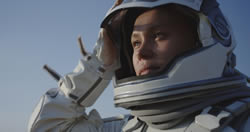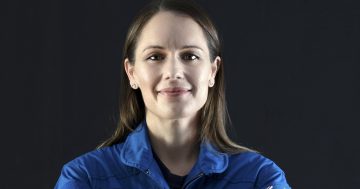Erin Woo* says the US space agency has doubled down on promises to put the first woman on the Moon by 2024.

Photo: Evgeniy Shkolenko
On the 99th anniversary of US women’s suffrage last week, NASA Administrator, Jim Bridenstine doubled down on promises to put the first woman on the Moon by 2024.
“I have an 11-year-old daughter,” Bridenstine said at an event at NASA to celebrate women’s leadership.
“I want her to see herself as having all the opportunities I saw myself having when I grew up.”
Currently, 12 of NASA’s 38 active astronauts are women, just less than a third.
But as the Artemis program — named for Apollo’s twin sister, the Greek goddess of the Moon — faces funding shortages and scientific obstacles, it remains unclear whether NASA will be able to send anyone to the lunar surface by the deadline at all.
Originally scheduled for 2028, the mission’s date was pushed forward four years to reduce the risk of a new White House and Congress changing its priorities in space.
“One of the challenges that we’ve had in history is the political risk that NASA accepts when programs have long periods of time,” Bridenstine said in an interview.
On the other hand, the accelerated timeline ramps up the pressure, as two essential components of a Moon landing — the Gateway space station that will orbit the Moon and a lunar lander that will bring the astronauts from the Gateway to the Moon — remain in development.
Funding for the project, which Bridenstine estimates at $20 to $30 billion over the next five years, has yet to be allocated.
But Bridenstine emphasised the program’s bipartisan support, a sentiment backed up by Democratic congresswoman Anna Eshoo, who expressed her “unwavering” support for the Artemis program and its budget.
“I believe that Artemis is something that will captivate not only our attention but the attention of whoever the next President is,” Eshoo said.
“We are poised and ready and we’re going to celebrate the first woman landing on the Moon in a handful of years.”
If Megan McArthur is any example, the aspiration for sending the first woman to the Moon should inspire countless young girls around the world to pursue careers in space and science.
McArthur grew up a Navy brat at Moffett Field and said watching the astronauts sparked her interest to become one herself.
“As a teenager, I watched shuttle-era astronauts come and park their jets on the ramp, and I thought, that looks like a pretty great adventure,” McArthur said.
“It was living right here that I was first inspired to pursue my dreams at NASA.”
The high school graduate flew on the Space Shuttle Atlantis’s final mission to repair the Hubble in 2009, and was one of the last astronauts to work on the space telescope.
Last week’s event featuring Eshoo and House Speaker Nancy Pelosi, hosted by the Silicon Valley Leadership Group, focused more broadly on women’s leadership and the state of gender equality in business.
In the first two panels, science and tech executives used their own experiences to frame a conversation on how far women have come and how far they still have to go.
Speakers commiserated over the obstacles they faced as the only woman in the room, including a male executive who required female employees to wear skirts “because he was a leg guy”.
Looking forward, they also urged employers to adopt policies like diverse hiring practices and increased maternity leave, as well as to support pipelines that encourage school-aged girls to pursue STEM careers.
“Once we make it to the board, we’re equal,” said Zoe Cruz, founder and CEO of the investment management firm EOZ Global.
“But I do feel that numbers matter — we can force change through sheer numbers.”
“And we’re not yet there, but we’re getting there.”
In the event’s keynote “fireside chat”, Pelosi and Eshoo swapped stories of their time in Congress and urged more women to run for public office.
“Just don’t run against us,” Eshoo said, laughing.
But amid their optimism, Pelosi also struck a bittersweet note.
“When people introduce me as the highest-ranking woman, I think, ‘Oh, I wish that I weren’t’,” she said.
“I had so hoped that we’d have a woman President.”
* Erin Woo is a journalist for the Stanford Daily and the Mercury News. She tweets at @erinkwoo.
This article first appeared at www.mercurynews.com.



